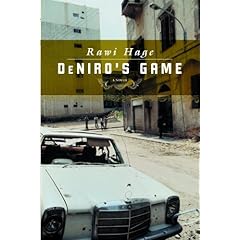 Bloodletting and Miraculous Cures by Vincent Lam (Winner)
Bloodletting and Miraculous Cures by Vincent Lam (Winner)In a collection of related short stories, the novel follows four young medical students attending the University of Toronto in the 1990s. Each chapter describes another chapter in their lives, often focused on one or two of the students and their various adventures in medicine and relationships. Although it is set in a familiar time and city, I couldn't connect with the stories of this book. The narrator's voice got under my skin somehow; maybe it's the direct and casual tone Lam uses that left me feeling a bit cynical. Of the four main characters, the only one who develops over the course of the novel is Fitz. While my mom felt dynamic tension in the novel and was anxious to see how the story played out, I wasn't drawn in. Living in Toronto during the SARS epidemic I feel I should have identified and empathised with the circumstances of the story more closely, but instead I felt let down by a lack of drama or angst. Rather than "well written" I'm going to say this novel is accurately written, so far as fiction can be accurate. To me Bloodletting and Miraculous Cures feels more like disconnected reportage than fictional prose.
 The Immaculate Conception by Gaétan Soucy
The Immaculate Conception by Gaétan SoucyThis novel was first written in French, translated by Lazer Lederhendler and submitted for the Giller Prize. It may be the translation itself that makes the writing in The Immaculate Conception feel a bit awkward but I think that's only part of it. The writing style intentionally evokes an earlier period, the 1920s in a suburb of Montreal. A socially inept bank clerk is the main character but other characters come forward to tell the aftermath of a large fire that kills 75 people in the community when an arsonist destroys a restaurant. The characters are memorable for their oddness and the story haunts me still for the insights it offers to community politics, intrigue, expectation and assumption. The meta-narrative and various micro-narratives that evolve during through the novel are retold from numerous perspectives and the reader gains a clearer picture of the events from each re-telling. Obvious from the title and reflective of the setting, the story is shot through with Catholic iconography and references. Soucy works very hard to build some mystery into the story and the reader waits a very, very long time to read about the initial incident that really sparks the story. Ooooh, sparks - I slay me. Essentially, it's an interesting novel for its character development and portrayal of community dynamics, but it's also very slow. When the initial incident was finally revealed to me, it wasn't the shock or the resolution I had been expecting/hoping for. If you have any interest in early Montreal or sparse, emotional writing reminiscent of Kafka or Camus, then try out The Immaculate Conception, just be prepared to be patient.
 DeNiro's Game by Rawi Hage
DeNiro's Game by Rawi HageMy sister gave me a copy of DeNiro's Game for christmas - thanks Kath! Set in Beirut, Lebanon during the civil war (1970s and '80s), the story follows Bassam, a young Christian, as bombs fall on his neighbourhood and his friends enlist in the militia. To the reader, Bassam's emotional detachment from the death around him, including losing both of his parents, is a thin ruse. He claims to be apolitical but refuses to fight even when his best friend enlists and starts to carry a Kalashnikov rifle. Bassam does get himself a handgun, and asserts himself throughout the novel so he's no pushover pacifist - far from it. When I started reading DeNiro's Game, I wondered how far into the story I would even get. I didn't know much at all about the Lebanese civil war, and this didn't seem like the way to learn about it. Usually I find stories set in countries and cultures that I'm ignorant of quite difficult to follow and thus boring. It's surprising then that this is my favourite of the three novels. Hage manages to describe the often irrational but necessary actions of everyday people in war times with clarity and without moral judgement. He leaves the reader to judge the actions of his characters, a fact I came to appreciate as the plot took twists and turns through moral minefields. The ending drew the story together for me and I won't ruin it for anyone by telling you why, but take my advice if you're having any trouble sticking with this book: keep at it and hopefully you'll find the same satisfaction of having read a finely crafted story that I experienced when I finished the last page.
Two left on the list. I'll pick them up soon and write up the details. So far I've been really suprised - by the winner, by my response to DeNiro's Game, and by the eloquence of a tale written in contemporary times that really embodies a past time.
Look ma, I'm getting my Can con.!
I came across you through this guilty pleasure of the "next blog" click feature of Blogger.
ReplyDeleteI appreciated the very thoughtful and
short reviews of the 2006 Giller's that you have finished.
And you have a cat (a good looking one at that) and that is always a bonus in a weblog world.
Thanks for visiting! It's nice to get comments from the wide blue aether to remind me I'm writing for an unknown audience... I hope you wander past me again sometime.
ReplyDelete